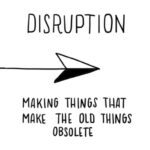
Here’s a problem that you might address as a startup founder: other startup founders struggle to find problems to take on, to come up with ideas to address, and to expose issues in industries, so that they might launch a successful venture presenting a solution to that problem.
How do I know this is a problem in need of a solution? Entrepreneur groups, startup social networks, and founder Q&A, are littered with questions about how to find and validate a problem to solve.
As I hope you’re aware, countless founders and companies are taking on the problems facing entrepreneurs themselves, and in a meta sort of self-referential way, it’s an incredibly interesting sector of the economy because if we’re going to enable greater success from entrepreneurs, we should tackle the problems they face.
In startup communities, we often talk about “dogfooding,” derived from “eating your own dog food,” which refers to when a company uses its own products or services to demonstrate confidence in them, which startup founders often do to test or validate their ideas. Solid advice, no?
What’s meta (and amusing) here is that this sector of entrepreneurship is like a film is about filmmaking or a book about writing books. The product or solution being created in this case is inherently tied to the founders’ own experiences as a founder, making it meta in a business context.
The problem I’m seeing with troubling regularity is that the work these founders is doing, is disappointing.
Startups solving founders’ problems are failing, and such founders, of all people, can’t be founding so poorly
I was asked the other week, “I built a website to expose pain points across industries, helping entrepreneurs save time by gathering problems for they can solve. Why is no one using the site?”
Now, I constantly remind founders to take advice with a huge grain of salt, and question everything they hear, but in this case, I replied so confident that I told them, “I am 100% certain in my answer, without even looking at your website nor giving a damn about your problem/solution statement or value proposition, because I can tell in your asking this that you didn’t do what matters, don’t respect what matters, or (and?) have advisors and a community of peers that are worthless to the point of harmful.”
And then it happened AGAIN, a different founder asked for advice of their solution for a problem they perceive founders face, a startup FOR startups, “Wouldn’t it be valuable to have real-time communication tools that connect startups, mentors, and investors seamlessly?” The answer is unequivocally no, but the fact that the question was asked prompted both my explanation (which you can read here) and the more thought here; how and why founders trying to solve perceived problems in entrepreneurship are clearly and completely missing the mark. Let me ask you to stick around a bit so we can explore what founders are failing, and why founders for founders (if you will) even more seriously need to take this to heart…
Decades of research based in the reality of what works for startups, is that Marketing is the most important thing you do. Doing it well will drastically increase your chance of success whereas doing it poorly will contribute to your fail; while neglecting it entirely, is just ignorant, stupid, and harmful.
Yes, I intend to be that harsh. Society continues to doubt, question, or argue about *marketing* because it doesn’t understand what it actually is, and dumbasses, who pretend to be Venture Capitalists or advisors, want to keep proclaiming that Sales is most important, that Marketing doesn’t work, or that you shouldn’t risk investing in either, until you are ready to sell your service.
Such people are morons to the point that they are harming founders.
Marketing is NOT promotions, advertising, content marketing, social media, SEO, Google Ads, or TikTok Videos. Anyone saying such a thing is marketing needs to be called out on their stupidity.
Marketing is the work of the market so as to create customers.
All of the work of the market.
Meaning, before you do ANYTHING, you should be marketing to determine if you should, how, why, and where.
These founders clearly did not.
How do I know they didn’t? Let’s look at the first question for what it is – why is no one using a website created to help founders find problems to solve within industries:
- I design and run incubators that help cities develop successful startup ecosystems. I’ve never heard of this website, nor the solution developed – is there not a more target customer or advisor than me? Asking the question suggests the founder just decided to make the website because they have experienced or observed entrepreneurs having trouble identifying problems. They’re not wrong, as I alluded previously, questions seeking an idea to address are prolific online.
- They built a website and expected people to just use it? Did you ever watch Field of Dreams? The movie. In my experience, only academics, engineers, and product people, drank the cool-aid that “if you build it, they will come” is true. A fiction film based in fantasy, building a solution NEVER means people will use it.
- They’re asking why people aren’t using the website, which tells us the founder knows nothing of content creation, social media, search, or other forms of freely available exposure. It’s not remotely hard to get people to use a service/website IF the service is worthwhile
- So… either they aren’t doing or don’t know how to do marketing, so that people would use the site, OR they didn’t do marketing to know how to create a valuable service. One of these things must be true.
Now, what I’m not advising is that you go pay for advertising! We’re uncovering how a founder can avert having such issues and questions from the start, because finding success with a startup is not about playing the long odds of trying to win, it’s addressing everything known to result in failure – so that you don’t.
Marketing is explicitly that work and it’s work you must prioritize above ALL ELSE. If you didn’t, can’t, or won’t, you will fail. Which means that we also have a #5 in my list above, that I can tell this founder with a website didn’t do marketing because if they had prioritized it properly the first thing they would done is find a cofounder experienced with it. Incapable or inexperienced yourself, you’d put first ensuring you have that partner, get them on the team since it isn’t you, and allocating as much equity as necessary to help ensure the startup has a shot at success; having done that, the founder wouldn’t be asking this question… because a marketer would have told them from the get-go.
Let me temper my harshness…
None of what I’m saying means the idea(s) here are poor. In fact, they’re reasonable and easy to appreciate even from only the question(s) asked of me and no more digging into what they’re doing necessary. I work with dozens of cities every year, and hundreds of founders, and generally speaking it is clearly evident that two major issues in innovation are market research and communication – both issues these founders are trying to tackle. So, what’s wrong?
These problems persist because people don’t know and aren’t prioritizing marketing.
This exemplifies the Problem Within the Problem
When you’re trying to solve a problem as a startup, only the misinformed who proclaim they’re following Lean Startup, create an MVP to test a hypothesis.
Any modestly experienced and intelligent founder KNOWS there is a problem; they likely know a potential solution to that problem. Why on earth would you need to test the solution to prove it there is a problem and potential solution?
The answer to that, is because other people are ignorant, don’t believe it, don’t understand, or don’t agree. That, because investors, advisors, and potential customers in the market, are ignorant of what should work, they’ll ask you for proof (validation) that it does. Ignore them. That ignorance misleads you and encourages you to focus on customers, because *they* don’t know what else to advise (after all, getting revenue sounds like reasonable advice). They cause you to fail because that’s just misleading, dumbass advice.
The issue as a founder isn’t that there is a problem. The question to address is WHY there is still a problem.
Why has this not yet been solved? The Problem Within the Problem
When you create and launch a solution so uninformed by not doing marketing, you are conveying that you didn’t do marketing BECAUSE you clearly didn’t investigate why it remains a problem. Or do you seriously want me to believe that the brilliant people in research companies, agencies, search engines, AI, economic development, venture capital, and accelerators, have no idea that these are problems worth solving?? That, they’re all good at their jobs but oblivious to this possibility that maybe we need a website to uncover problems in industries because entrepreneurs can’t find problems to take on??
b.s.
MAYBE this is a problem because people don’t do marketing and MAYBE the reason 90% of all startups fail is because they don’t do marketing and MAYBE if they did marketing, this solution, such as it is, is irrelevant… or maybe it is helpful, but marketers know what they’re doing so they don’t need it, while other founders who don’t prioritize marketing aren’t seeking this because they think they know better.
A ha!
This is why no one is using a website that uncovers problems for would-be founders.
Marketers explicitly uncover pain points across industries so the very nature of proposing a solution as a founder, when it’s obvious why it remains a problem or it’s obvious (to marketers) why no one is using it, is the evidence inherent that the venture is going to fail.
This is the foundation of marketing taught in Marketing 101 in college.
But founders, you saw that people are struggling with a problem, in this case, with identifying pain points across industries… so you built a thing that solves the problem – for whom?? For people that don’t know how to do that? GREAT (seriously, great!) but then how and where are you going to find the people that are incapable of this core requirement of startup success?
If you fail to first address that people actually need the solution or fail to address how to capably acquire them, but have already built a solution, you should shut down now because you’re predetermined to fail.
Let’s get back to this focus on the website for entrepreneurs to uncover pain points in industries… I’ve never heard of the given startup – and I deal with this problem specifically, in cities, in countries, with VCs, and with founders… yet the founder didn’t even get my attention to talk to me, ask me, or engage me. Let’s not make this about me, have you not come across a startup pertinent to your industry and thought, “how the heck could you be at the point you’re at and I’ve never heard of this?!” Arguably, someone like me (like you in your case) is the most important person in the ecosystem, and the founder failed to connect with us.
This startup is hoping to go “direct” to entrepreneurs who can’t even figure out what problem to solve. Frankly, that’s a terrible target market. If they can’t figure out what pain point they might address in a sector, obviously they *aren’t* using search engines or social media to figure it out – in the process finding this website… negating the question to begin with because the website would have traffic – or the founder of this website isn’t familiar with search engines and social media properly to be found.
Which is it? Probably both. Can you see how they’re certainly going to fail and never should have built a website without first addressing these fundamental challenges?
Marketing is all of the work of the market. Founders, what does that mean so that you can identify the problem within the problem and create a solution that might work?
- Who are the competitors? Why do they fail?
- Who would pay for this? Why? Where are they?
- Do investors agree?
- Do companies, potential partners, and competitors, agree with your solution or will they work against you?
- What kind of team do you need in place to be successful? Why those skills? Where will you find them?
- What channels will efficiently scale awareness, influence, and demand for what you’re doing?
- Marketing is the work that *informs* the business if it needs to and/or should do advertising, hire sales, or run promotions. If you’re having to do that because nothing works, it’s because you’re not marketing to figure out what would work.
- Why a website? Why not an app? Why not consulting? If a website, should that be AI or a search engine? Maybe it should be crowdsourced feedback or a database or 3rd party research… I don’t know, the work of marketing is figuring it out.
Noted economists have pointed out notions such as, ‘if you have to do advertising, it’s because your marketing is failing,’ and ‘the purpose of marketing is to make salespeople extraneous.’
If you have questions about growth or finding customers, you certainly should not yet have a solution.
That list of bullet points is a brief list among many more things that define “marketing,” and anyone who tells you otherwise is harming your potential as a founder. Marketing is the most important thing you do, hands down, unequivocally, and I GUARANTEE you everyone who disagrees with my definition or my assertion is wrong.
Which is a roundabout way of saying that if you need to be doing those things, it’s because you aren’t doing what matters. And founders often come to me frustrated that investors won’t take their startup seriously… this is why.






Because it’s hard and a lot of people say they know how to do it but they don’t.
This seems like a facet of the often-shunned and under-appreciated “Customer Development/Customer Validation” diligence – aka Market Research .
I think I mentioned this on one of your previous posts, and I’m an admitted newb to all of this, but the way I see my role as founder is “find the market I’m passionate about serving and ask them what their challenges are. If they would be willing to pay to overcome that challenge, then let’s build a solution to it. Otherwise, let’s not waste everyone’s time.”
In other words, I’m not here to deliver a product, I’m here to deliver a market. The market tells me what product(s) they would be eager to pay for. We build that.
Mark Leutwyler as a market researcher, I concur. Couldn’t tell you how many times I have seen solutions looking for a problem.
Absolutely. Choosing startups to be your target customer increases failure rates. As a startup, you’re often better off having vendors and partners that are non-startups because larger orgs have a different set of strengths and weaknesses. For example, Amazon made a ton of money off startups via the AWS free tier offer, but Amazon wasn’t a startup – thus could really add value with it’s datacenters in a way that startups couldn’t.
Mark Biw startups as customers is precisely why most local incubators or accelerators end up being coworking and event spaces. It’s rather difficult to monetize people who should be spending what little they have, on better things, while your brand attempts to convey that it causes those people to have successful startups (a goal that has the market heavily stacked against you already).
I’ve always felt property and programs need to be separate, with properties paying programs to provide value, and founders always welcome for free. There is a reason why Silicon Valley startups have a reputation of coming out of garages and coffee shops… spending money on space is a little silly when you’re trying to prove that something might be a viable business.
“I built a site to help entrepreneurs find problems to solve. Why is no one using it?”
I hate this more than words can possibly express. I got into entrepreneurship the normal way: I got a job and found that there were parts of that job I hated so I found a way to do them better. Then I turned that into a commercial solution.
This person wants to be an entrepreneur for entrepreneurship sake which will end in disaster. Solving the problem of finding problems to solve. Like you said… “meta”. And worthless. I tried to Google a site that did that but couldn’t identify one particular site that did what you just said so I came up with the absolutely brilliant concept of solving my problem by building a website consolidating websites that solved the problem of finding a problem to solve. Go me, right? Worth a million bucks, right? No amount of marketing is going to solve that.
Here’s a question for you, Paul, as I am a little bit more removed from the scene than you are. Have there been any unicorns (as that seems to be how the industry defines massive success) that came from some folks “trying to find a problem to solve” as opposed to people who were directly impacted by an issue that was ripe for resolution?
I am looking at this list of 99 Problems that inspired startups and I have yet to see one where people got together and just tossed out ideas until they found something they thought others would pay for.
Anyway, this rant has gone on long enough. My advice for would be entrepreneurs looking for problems to solve is “Get a job.” I can guarantee that wherever they end up working, there will be some dated and tedious process rife within the industry and ripe for a 21st century solution.
/end rant.
https://www.opinionx.co/99-problems
E. Aaron Cartwright III are there any unicorns that are the result of people searching for a problem (rather than founders being directly impacted)?
You know, I can’t say with certainty which, but I can say with certainty that the answer is yes.
Again, don’t quote me that these specific companies did so, but they are examples of addressing a problem better than predecessors…
Uber didn’t invent ride-sharing. I think they saw the problem that the market needed mass adoption for it to work, so they went that direction.
Hubspot didn’t invent the CRM but they knew that Salesforce was ignorantly expensive and complicated.
MailChimp didn’t lead the way on newsletters, they saw the problem in the space of deliverability and ease of management.
Oh shoot! I just came up with one: Google
The founders didn’t come from the search or directory industry, but they saw that the problem of a managed directory could be solved with crawlers and a weighted index.
We on the right track?
Marketing is highly slept on, but I think a lot of businesses like this back their solution into a problem and assume it’s just a WIN. That it will sell itself. Etc. Because of course it’s that easy!
I am curious about how many of these ideas are actually viable, and if marketed properly, would be successful. I might sound like I’m 200 years old here but I just see more businesses being the “Uber of X” or the “AirBNB of Z” or whatever … I think at the end of the day this subset of founders just don’t want to look in the mirror and see their concept might need some severe changes or might just be an L. Which is normal by the way!
Not sure if anything I said here surprises anyone. But yeah I think skimming over market research and assuming your concept will sell itself is quite lazy and foolish at the end of the day.
Scott Good well, clarify what you mean by “if marketed properly,” because I sense that you mean, if promoted properly.
The fact is that yes, if marketed properly, every business would succeed. Because businesses would know what to do, when, how, and what to avoid, if they were actually marketing. Having to promote/advertise is because the business is NOT marketing well.
Market research is marketing.
Maybe I’m old fashioned, but real entrepreneurs don’t “look for problems to solve” – they have a deep understanding of a market, or a technology – and determine that a startup is the best way to develop it. Or they have an “itch they need to scratch.” And then they persist & adapt until they succeed, or run out of cash to keep going.
Miles Fidelman I think the “itch to scratch” is the more accurate distinction of entrepreneurs from other founders and business owners. Lots of people want to own their own business, try starting one, or want to create some solution; what makes a person an entrepreneur is that it’s innate – they can’t help themselves and yet, will use everything they have to keep trying. It’s who they are.
This is market fit and it’s what I do for a living. It’s hard to see startup founders that don’t get the markets feedback while the problem they solve is being built. What are the REAL metrics around savings in both cost and time based on that customer not some theoretical number.
macmovieman, Very well said, but I don’t want to let that customer focus to overshadow my broader point, that what is really failing founders is that they don’t do market research: competitors, investors, trends, history, etc.
You might find customers that think it’s a great idea, and even some who will pay, but your work is going to fail if the market won’t bear it.
great mostly true points-it seems somewhat stretched even for a marketing guru to put all that into “marketing” when a term is expanded that far it starts to loose shape and meaning
I would add a question that needs asking: is my target group willing to pay for this?
Ron Clark fair point and yet it’s a perspective derived from the last 30 years and how the internet caused marketing to be fractured into distinct product, sales, and research roles. Historically, and in University marketing curriculum, Marketing is all of those things. It’s not stretched… 4Ps (product, etc.)
Sure, yes, I’m pushing it a bit but I think we need to because people are asserting that it means advertising, growth, leads, or customers; and that’s *absolutely* wrong, but conveying that is causing a lot of businesses to fail – because they do “that” and then claim marketing doesn’t work.
Keep in mind, marketing is not a role like accounting. Accounting is an action that is Finance, among many things. Advertising is similarly, an aspect of marketing. We get misled because organizations do indeed have a CMO, but that Marketing facet is critical as technology, finance, or human resources… In the same vein, if you were to neglect or under appreciate any of those things, your business will fail.
Well you know I love what you’re saying they need to prioritize! ? Maybe they’re missing it because everyone thinks they are naturally doing it / anyone can do it / it’s easy or unnecessary. In my 20+ years as a marketing leader, I’ve seen many entrepreneurs dismiss marketing with the whole “if we build it, they will come” mentality. Until they don’t. Also, a lot of entrepreneurs don’t want to spend the money to make marketing work.
There are two problems here.
It’s not necessarily a “marketing” issue, as opposed to a “market research” or “customer insights” issue to begin with.
Most entrepreneurs today start at the wrong step of the process. They begin with the technology, (cloud, social, or AI), then build a product leveraging that technology, (website, saas, community), and then try to figure out who the customer is, and what problem they want to solve.
If more entrepreneurs started with who is the customer, what is their problem, what product could you build to solve that problem, then what technology would help you build that product, we would see more success.
However, part of this is the understanding of what marketing is, to your point.
Marketing is actually a Research and Development (R&D) role within an organization. It should be the foundation for understanding the customer and the market problem.
Customer -> Problem -> Product -> Technology
If you did it this way, you’d hire your marketing before you designed or built your product.
Chris Hood disagree slightly.
I seem to have found some decent success in hating certain aspects of a job then designing a solution to make that part of the job slightly more palatable.
I would argue:
1. Problem – So you know what, if anything, is an actual issue.
2. Customer – Is this a local issue or endemic of the industry?
3. Product – What’s the solution?
4. Tech – What is the product that will provide the solution to the problem?
E. Aaron Cartwright III but problems don’t exist without customers or people. In your situation, you were the customer, with a problem.
Based on the original post, people want to solve entrepreneurs’ problems, you have to talk to the entrepreneurs to understand those problems.
You could hypothesize a problem, then talk with customers to validate it, but the customer is, and always will be who you are serving first.
Although, in general, we’re nitpicking between the two.
Chris Hood Market research = marketing
The biggest mistake that society has made for our economy, in the last 30 years, is splitting all of what is marketing away from marketing as though it is something else.
When you tell people to do “market research” you’re not wrong, but you enable people to conclude the marketing is different from that. Marketing without market research is waste. Founders and businesses that hire marketers/agencies that don’t capably do that, get disappointed in the failure, and then blame “marketing.”
It’s like saying sales is more important than marketing. No…. Marketing is what causes sales and if you only focus on sales, you will not be successful, you’ll be misled by some customers or revenue.
That discernment aside, you’re 100% right, marketing > product because marketing is what informs, defines, and decides what product should be.
Chris Hood E. Aaron Cartwright III
Another thought on this thread… “problems don’t exist without customers.”
I’ve found that one of the best distinctions of a startup from a new business (not the same thing) is that the purpose of a startup is to “create” customers. That, if it’s a new business similar to existing businesses, the fact is established that the business *should* work because you can replicate that model and serve the existing customers. That’s not what startups do, and that’s why new businesses shouldn’t be called startups: startups are temporary ventures in search of a new, competitive, and sustainable business model – meaning in fact precisely that a problem exists for which there are not yet clear customers. A startup is taking on the problems that remain despite existing businesses; and it’s often uncovered that in disrupting the status quo, the customer is someone other than was previously the case.
Or at least, the existing customers don’t yet know that they are for the new.
Fair enough. But “own your own business” is not a great reason to found one. Buy one. Buy into a franchise. Ply one’s trade as a consultant or contractor. But starting something from scratch, without a clear mission is generally a recipe for disaster. At least that’s been my observation.
Of course, I should add, I have a rather jaded view of “marketing.” I do big ticket sales & system development for a living – it’s all about rifle shooting. Marketing departments make a big deal about lead generation, and providing standard slide decks about company capabilities, and boilerplate for inclusion in proposals – but, at best, their efforts create some positive image in the market, maybe get people into trade show booths – but ultimately, we all find our own customers, create our own pitches, and mostly write custom proposal material.
Granted there are product & service categories that are mass marketed, but that’s really more like mass SALES – moving the point of sales out to the customer, so that they can see it, click on it, or take it off a shelf.